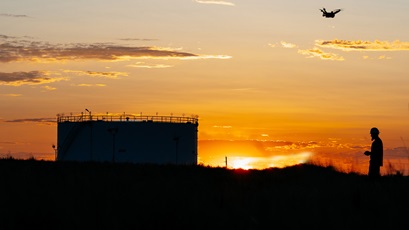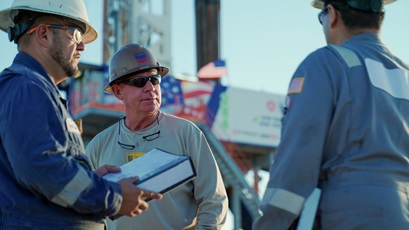our operations
expansion of offshore israeli reservoir hits the gas
2 min read | march 17, 2023
The Tamar Platform in the Mediterranean Sea off the coast of Israel.
Less than 20 years ago, Israel relied almost entirely on coal and other fuel imports for its electricity generation. Today, the Middle Eastern country has gone beyond gaining energy independence and is now expanding its energy footprint to exporting to neighboring countries.
driving the news
The Tamar natural gas reservoir, approximately 55 miles (about 89 kilometers) off Israel’s northern coast, is undergoing a capacity expansion to optimize current natural gas production capabilities.
Phase 1 of the two-phase project was greenlit last year by Chevron Mediterranean Limited and the working interest owners of the offshore project.
breaking the bottlenecks
When gas began to flow from offshore Israel in 2004, it triggered a new era of energy security.
Right now, two subsea gathering pipelines at Tamar carry gas from an offshore manifold to the Tamar processing platform, and from there to shore. We are adding a third pipeline to reduce system bottlenecks and increase capacity.
The second phase of the project will see us utilize in place compressors that aren’t currently in use. During the same period, Israel Natural Gas Lines will work to debottleneck its onshore network so that it can deliver additional gas to neighboring nations.
“We’re adding more lanes to the highway,” said Bill Pritchett, Chevron project management advisor for the region. “We’re adding those lanes to both the onshore and offshore networks so we can, beyond meeting domestic demand, supply energy to Jordan and Egypt.”
a sea change
Bringing the Tamar capacity expansion project to fruition will require the efforts of both people and machines. The new pipeline going under the Mediterranean Sea will be laid by a special marine vessel.
“This project is exciting not only because we’re executing state-of-the-art technical work, but because of the geopolitical backdrop,” Pritchett said. “We’re continuing to provide energy security to the State of Israel, and by doing so, Israel can continue with exports to Jordan and Egypt. This ultimately helps with the overall stability of the region.”
Once both phases of the project are complete, we expect to increase production capacity by more than 40%.
tali lederman
tamar’s asset manager
“I have witnessed first-hand the breadth of knowledge, expertise and strong financial backing that Chevron has brought to our business in the Eastern Mediterranean,” added Tali Lederman, Tamar’s asset manager. “There is no doubt in my mind, this will be the first of many new opportunities we will see coming out of the region under the Chevron name.”
why it matters
Until 2004, Israel had to import nearly all the fuels used in electricity generation. The tides are now turning.
When the Tamar expansion is complete, it will enable us to continue to meet Israel’s growing domestic demand and increase our natural gas delivery to neighboring countries.
It’s an exciting prospect for Lederman.
“This development, when completed, will secure Israel’s domestic needs for years to come and assist in establishing regional stability through gas exports in an area of the world where stability is a luxury,” Lederman said. “As an Israeli, I am honored to be a part of this project and see it progress into successful execution.”
on realizing a pipe dream
Pritchett said that just seven years ago the idea of Israel enabling energy security for other nations seemed impossible.
bill pritchett
project management advisor
topics covered
related content
-

 how APOLO helps chevron pinpoint prime drilling locations
how APOLO helps chevron pinpoint prime drilling locationsour operationsnovember 12, 2025
-

 robotics supports more efficient workplace
robotics supports more efficient workplaceour operationsnovember 10, 2025
-

 the people who power the US energy advantage
the people who power the US energy advantageour operationsnovember 06, 2025
-

 a statement from chevron CEO mike wirth on Argentina
a statement from chevron CEO mike wirth on Argentinaour operationsseptember 24, 2025
chevron email updates
Subscribe to our newsletter to receive news and updates.



